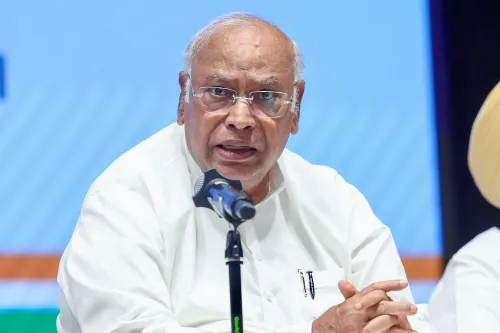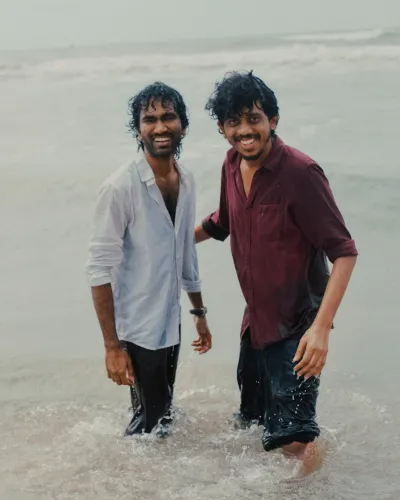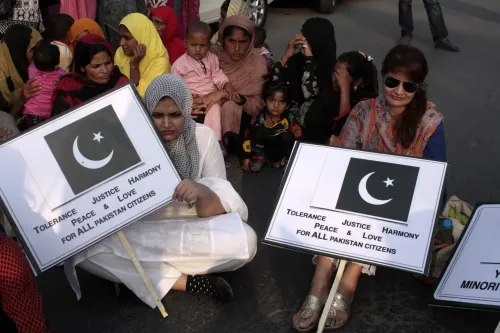Can Congress Intimidate BJP and RSS with Just 2-3 State Governments?

Synopsis
Key Takeaways
- Shobha Karandlaje criticizes Congress's ban on RSS.
- Limited governance in two states cannot intimidate BJP and RSS.
- Historical context of earlier bans on RSS highlighted.
- Concerns over public participation in government schools raised.
- Opposition leaders question the motives behind the ban.
Bengaluru, Oct 16 (NationPress) Denouncing the Congress-led Karnataka government's choice to prohibit the activities of the Rashtriya Swayamsevak Sangh (RSS) in public spaces, Shobha Karandlaje, the Union Minister of State for the Ministry of Micro, Small, and Medium Enterprises, stated on Thursday that the Congress is mistaken if they believe that governing just two or three states can intimidate the BJP and RSS.
Karandlaje expressed, "If they (Congress) run governments in only two or three states and think they can intimidate the BJP and RSS, it is nothing but foolishness."
Addressing the media in Bengaluru, she challenged State Rural Development and Panchayati Raj Minister Priyank Kharge, who proposed the ban on RSS, asking if he could genuinely impose such a prohibition.
She further questioned the Congress party: "In 1948, the RSS was banned. What was the outcome? You achieved nothing. During the Emergency in 1975, our leaders were imprisoned, including L.K. Advani and Atal Bihari Vajpayee at Freedom Park. What was the result?"
"Can you truly ban the RSS? The RSS, which was unafraid of Jawaharlal Nehru or Indira Gandhi, will certainly not be intimidated by a sycophant like Priyank Kharge," she added, emphasizing that Congress governments, like that of Siddaramaiah, have faced similar situations repeatedly in this nation.
Karandlaje asserted, "Today, the RSS has flourished into a robust entity. What Nehru and Indira Gandhi could not achieve, can Priyank Kharge—who exists solely in the shadow of Congress President Mallikarjun Kharge—possibly accomplish? Can CM Siddaramaiah, who constantly bickers for the position of CM, genuinely achieve this?"
The Leader of the Opposition in the Legislative Council and senior BJP leader, Chalavadi Narayanaswamy, remarked, "In today’s Cabinet meeting held by the Karnataka government, Minister Priyank Kharge faced a setback. They aimed to target the RSS, but nothing of that sort transpired. Instead, they re-implemented the law established by the previous BJP-led state government, which mandates all organizations to secure prior permission before conducting events."
"This regulation has been in place for an extended period, during the tenures of all state governments. By attempting to cast the RSS in a negative light, Priyank Kharge achieved nothing more than this. There is a larger context to this decision. Their own voter base, the Muslims, used to gather in large numbers during festivals. Following this, they began to pray in public places across Karnataka, obstructing roads. Minister Priyank Kharge, intolerant of this, sought methods to restrict the Muslims," Narayanaswamy continued.
"Minister Priyank Kharge could not confront them (RSS) directly. Under the guise of criticizing the RSS, he has now ensured that permission is required for all religious events. For this, I commend Minister Kharge, even though he opposes the BJP and RSS," he stated.
State BJP General Secretary and MLA V. Sunil Kumar claimed, "This is a conspiracy to alienate the public from government schools. In today’s Cabinet meeting, a resolution was passed to impose restrictions on private events occurring in government and unaided schools, as well as in other government-owned venues. Through this, the state government is inclined to restrict public involvement in government schools."
"Mandating prior permission for private organizations to hold activities in school premises and the intent to limit the entry of private individuals—what could be the motive behind this?" he questioned.
"Rural government schools are not merely educational institutions. On weekends, they function as venues for association meetings, cultural programs, and sports events. Will the state government now prohibit all these as well? Restricting access to government school premises equates to severing their connection with the public, and in the long run, it appears to be a plot by the government to shut down government schools. This is nothing but a childish decision by the Karnataka government," Sunil Kumar criticized.









